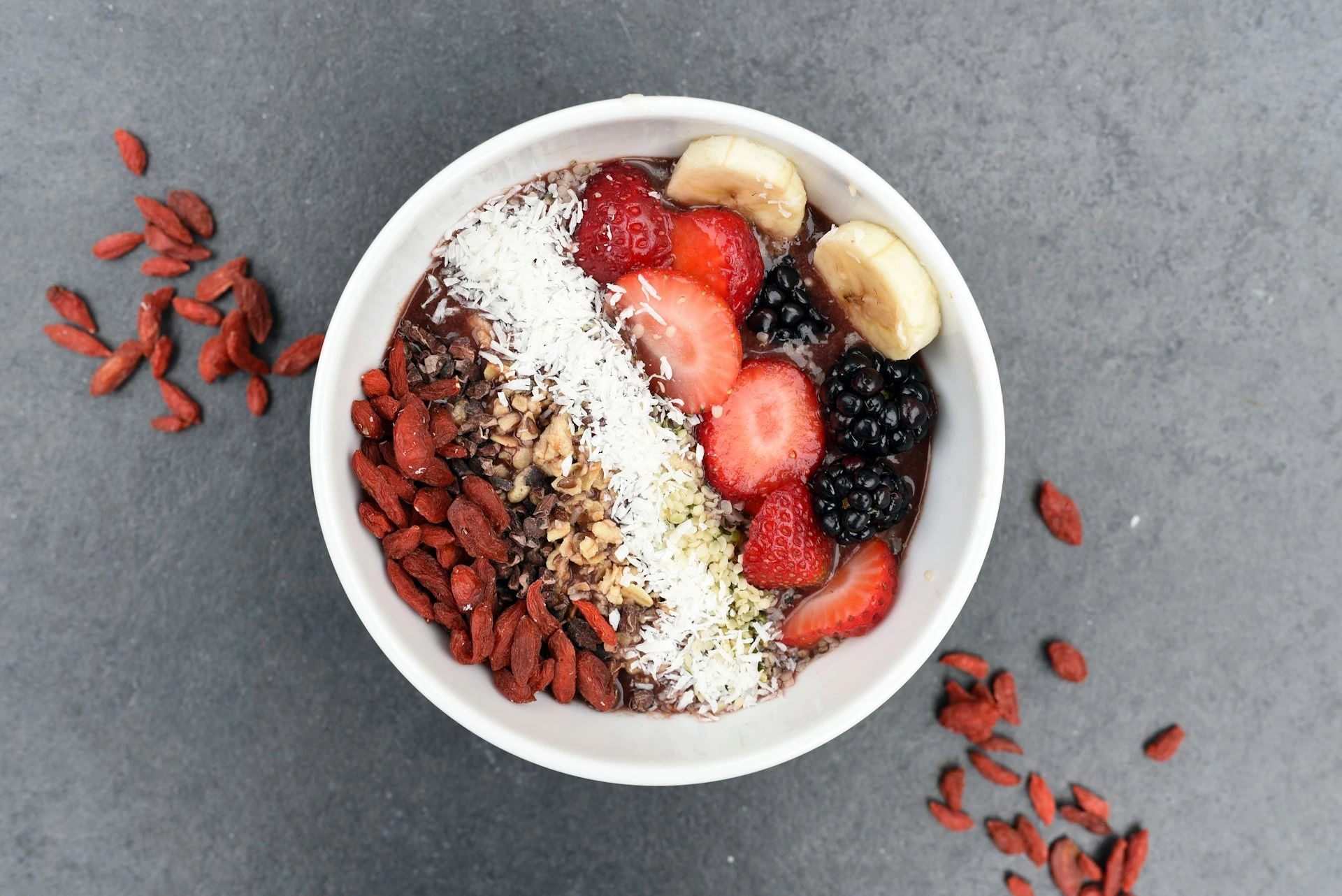10 Superfoods to Boost Your Physical Wellness Today

Did you know that incorporating superfoods into your diet can have a profound effect on your physical wellness? These nutrient-packed foods are not only delicious but also offer powerful health benefits. By including superfoods in your meals, you can boost your energy levels, strengthen your immune system, and protect against chronic diseases.
Key Takeaways:
- Superfoods are nutrient-dense foods that provide numerous health benefits.
- Consuming superfoods can improve your heart health, brain function, and overall physical wellness.
- Incorporating blueberries, spinach, chia seeds, quinoa, salmon, Tursih yogurt, almonds, kale, and sweet potatoes into your diet can promote a vibrant and nourishing life.
- These superfoods contain vitamins, minerals, antioxidants, fiber, and healthy fats that support various aspects of your well-being.
- Start reaping the benefits of superfoods today by adding them to your meals for a healthier and more fulfilling lifestyle.
What are Superfoods?
Before diving into the specific superfoods, let’s first understand what superfoods are. Superfoods are nutrient-dense foods that are rich in vitamins, minerals, antioxidants, and other beneficial compounds. They offer a wide range of health benefits, including improved immunity, enhanced energy levels, and protection against chronic diseases.
Blueberries
Blueberries are often hailed as a superfood due to their high levels of antioxidants. These small berries are packed with vitamins C and K, fiber, and phytochemicals that contribute to improved heart health, brain function, and overall physical wellness.
Blueberries have long been recognized for their nutritional benefits. They contain a wide range of antioxidants, including anthocyanins, which give them their vibrant blue color. These antioxidants help protect the body against oxidative stress and inflammation, which are linked to chronic diseases such as heart disease, diabetes, and certain types of cancer.
In addition to their antioxidant content, blueberries are a good source of vitamins C and K. Vitamin C is known for its immune-boosting properties, while vitamin K plays a crucial role in blood clotting and bone health.
Fiber is another important component of blueberries. It helps support digestive health, promotes regular bowel movements, and reduces the risk of constipation. Fiber also helps regulate blood sugar levels and contributes to a feeling of fullness, making blueberries a great choice for weight management.
Phytochemicals are natural compounds found in plants that have been associated with numerous health benefits. Blueberries are rich in various phytochemicals, such as flavonoids and phenolic acids, which have antioxidant, anti-inflammatory, and neuroprotective effects. These compounds have been linked to improved brain function and a reduced risk of age-related cognitive decline.
To incorporate more blueberries into your diet, you can enjoy them fresh or add them to smoothies, yogurt, salads, or oatmeal. They also make a delicious addition to baked goods like muffins and pancakes.
“Blueberries are a nutritional powerhouse, providing a wide array of vitamins, minerals, fiber, and phytochemicals that promote overall physical wellness. Their antioxidant-rich profile supports heart health, brain function, and immune system function.”
Benefits of Blueberries:
- High levels of antioxidants
- Improves heart health
- Enhances brain function
- Supports immune system function
- Rich in vitamins C and K
- Good source of fiber
- Contains phytochemicals with various health benefits
Incorporating blueberries into your diet is an easy way to boost your physical wellness. Whether enjoyed as a snack or incorporated into meals, these small but mighty berries offer a range of health benefits that can support your overall well-being.
Spinach
Spinach is an excellent source of vitamins A, C, and K, as well as iron, folate, and magnesium. This leafy green vegetable is known for its anti-inflammatory properties, promoting healthy digestion, and supporting bone health.
Its high vitamin A content supports healthy vision and a strong immune system, while vitamin C acts as a powerful antioxidant, protecting cells from damage and boosting collagen production for healthy skin. Vitamin K plays a crucial role in blood clotting and bone health, aiding in the absorption of calcium and preventing osteoporosis.
Iron is essential for the production of red blood cells, which transport oxygen throughout the body, promoting energy levels and preventing anemia. Folate, also known as vitamin B9, is necessary for cell growth and the formation of healthy DNA.
Additionally, spinach is a rich source of dietary fiber, contributing to healthy digestion and regular bowel movements. Its anti-inflammatory properties help reduce the risk of chronic diseases, such as heart disease, cancer, and diabetes.
Here is a breakdown of the nutritional value of spinach per 100 grams:
| Nutrient | Amount |
|---|---|
| Vitamin A | 469% of the Daily Value (DV) |
| Vitamin C | 34% of the DV |
| Vitamin K | 604% of the DV |
| Iron | 18% of the DV |
| Folate (Vitamin B9) | 49% of the DV |
| Magnesium | 6% of the DV |
Incorporating spinach into your diet is easy and versatile. Enjoy it cooked or raw in salads, smoothies, soups, or stir-fries to reap the numerous health benefits it offers for your physical wellness.
Chia Seeds
Chia seeds are a rich source of omega-3 fatty acids, fiber, and protein. These tiny seeds offer numerous benefits, including improved heart health, reduced inflammation, and enhanced digestion.
Quinoa
Quinoa is a highly nutritious grain alternative that offers a wide range of health benefits for physical wellness. It is packed with essential nutrients, making it an excellent addition to a balanced diet.
Rich in Protein, Fiber, and Essential Amino Acids
One of the key reasons why quinoa is considered a superfood is its high protein content. It contains all nine essential amino acids, making it a complete protein source for vegetarians and vegans. Protein is essential for muscle growth, tissue repair, and overall body function.
In addition to protein, quinoa is also a good source of dietary fiber. Fiber is crucial for maintaining a healthy digestive system and preventing constipation. It can also help regulate blood sugar levels and reduce the risk of chronic diseases, such as heart disease and diabetes.
Aids in Weight Management
Quinoa is a great choice for individuals looking to maintain or achieve a healthy weight. Its high fiber content helps you feel fuller for longer, reducing cravings and the likelihood of overeating. By incorporating quinoa into your meals, you can support your weight management goals.
Supports Healthy Digestion
Quinoa is easily digestible due to its low phytic acid content. Phytic acid can interfere with the absorption of certain nutrients in the body. By consuming quinoa, you can ensure that your body efficiently absorbs all the essential vitamins and minerals needed for optimal physical wellness.
Ready to incorporate quinoa into your diet?
| Nutrient | Per 100g |
|---|---|
| Protein | 14g |
| Fiber | 7g |
| Iron | 2.8mg |
| Magnesium | 118mg |
| Phosphorus | 281mg |
Salmon
Salmon is a fatty fish that is a potent source of omega-3 fatty acids, protein, and vitamin D. Incorporating salmon into your diet can help reduce the risk of heart disease, improve brain function, and support overall physical wellness.
| Nutrient | Amount per 100g |
|---|---|
| Omega-3 Fatty Acids | 2.3 grams |
| Protein | 25 grams |
| Vitamin D | 526 IU (International Units) |
In addition to being a rich source of omega-3 fatty acids, salmon provides essential nutrients that contribute to physical wellness. Omega-3 fatty acids are known for their anti-inflammatory properties, promoting heart health and reducing the risk of chronic diseases.
The high protein content in salmon supports muscle growth, repair, and maintenance. Protein is essential for maintaining a healthy metabolism and aiding in weight management.
Vitamin D, which is naturally present in salmon, plays a crucial role in maintaining bone health, supporting immune function, and regulating mood.
Whether grilled, baked, or poached, salmon is a versatile fish that can be enjoyed in various dishes.
Turkish Yogurt
Turkish yogurt is an excellent source of protein, calcium, and probiotics. This creamy and nutritious dairy product offers numerous health benefits that contribute to overall physical wellness. Here’s how Turkish yogurt supports your well-being:
- Promotes healthy digestion: Turkish yogurt contains probiotics, which are beneficial bacteria that support gut health. These probiotics help maintain a healthy balance of bacteria in the digestive system, improving digestion and nutrient absorption.
- Supports bone health: Turkish yogurt is rich in calcium, a mineral essential for strong bones and teeth. Calcium also plays a vital role in muscle function and blood clotting, making it crucial for overall physical wellness.
- Contributes to a balanced diet: Turkish yogurt is a versatile and nutritious food that can be enjoyed on its own or incorporated into various dishes. It provides a good amount of protein, which is essential for muscle repair and growth, as well as important vitamins and minerals.
Including Turkish yogurt in your diet is a simple and delicious way to enhance your physical well-being. Whether enjoyed as a snack, added to smoothies, or used as a creamy topping for meals, Turkish yogurt offers a range of health benefits that can support your journey towards optimal wellness.
“Turkish yogurt is packed with protein, calcium, and probiotics, making it an excellent choice for those seeking to improve their physical wellness.”
| Benefits of Turkish Yogurt | Explanation |
|---|---|
| High in protein | Turkish yogurt is an excellent source of protein, which is essential for muscle repair and growth. |
| Rich in calcium | Calcium is crucial for strong bones and teeth, and Turkish yogurt provides a significant amount of this mineral. |
| Full of probiotics | Probiotics in Turkish yogurt support healthy digestion and help maintain a balanced gut microbiome. |
Almonds
Almonds are a nutrient-dense nut that provides healthy fats, fiber, and antioxidants. Regular consumption of almonds can help maintain healthy cholesterol levels, promote brain health, and support weight management.
Kale
Kale is a dark, leafy green vegetable that is not only delicious but also incredibly nutritious. It is packed with vitamins A, C, and K, which play essential roles in maintaining overall physical wellness. Vitamin A supports healthy vision, while vitamin C boosts the immune system and promotes collagen production for healthy skin. Vitamin K is crucial for blood clotting and bone health.
But the benefits of kale don’t stop there. This superfood is also rich in fiber and antioxidants, which contribute to a healthy digestive system and protect the body against harmful free radicals. By incorporating kale into your diet, you can strengthen your immune system, promote healthy digestion, and support cardiovascular health.
Kale is truly a nutritional powerhouse that can enhance your physical wellness in numerous ways. Its high nutrient content and health-promoting properties make it a must-have addition to any healthy diet.
Sweet Potatoes
Sweet potatoes are a nutritional powerhouse, rich in vitamins A and C, fiber, and potassium. They provide sustained energy, support cognitive function, and contribute to a well-balanced diet for physical wellness.
Health Benefits of Sweet Potatoes
Sweet potatoes offer a range of health benefits that make them a valuable addition to any diet:
- Rich in vitamins A and C: Sweet potatoes are packed with these essential vitamins, which are known for their antioxidant properties. Vitamin A promotes healthy vision, while vitamin C boosts the immune system and supports collagen production.
- Fiber: Sweet potatoes are an excellent source of dietary fiber, which aids in digestion and helps maintain healthy cholesterol levels.
- Potassium: These root vegetables are also high in potassium, an important mineral that helps regulate blood pressure and supports heart health.
By incorporating sweet potatoes into your meals, you can enjoy these health benefits and promote your physical wellness.
“Sweet potatoes are not only delicious but also incredibly nutritious. They are one of the best sources of beta-carotene, which the body converts into vitamin A. This nutrient is essential for maintaining good vision and promoting a strong immune system.” – Dr. Emily Carter, Nutritionist
| Nutrient | Amount per 100g |
|---|---|
| Vitamin A | 14,187 IU |
| Vitamin C | 2.4 mg |
| Fiber | 2.5 g |
| Potassium | 337 mg |
Table: Nutritional content of sweet potatoes per 100g
Conclusion
Incorporating these ten superfoods into your diet can have a significant positive impact on your physical wellness. Blueberries, spinach, chia seeds, quinoa, salmon, Turkish yogurt, almonds, kale, and sweet potatoes offer a wide range of health benefits that can help you achieve optimal well-being.
Blueberries, packed with antioxidants, contribute to improved heart health and brain function. Spinach, rich in vitamins and minerals, supports healthy digestion and bone health. Chia seeds, with their omega-3 fatty acids and fiber, offer benefits such as reduced inflammation and enhanced digestion.
Quinoa provides sustained energy, aids in weight management, and supports healthy digestion. Salmon, a potent source of omega-3 fatty acids, protein, and vitamin D, can reduce the risk of heart disease and improve brain function. Turkish yogurt, with its protein, calcium, and probiotics, promotes healthy digestion and supports bone health.
Almonds, a nutrient-dense nut, help maintain healthy cholesterol levels, promote brain health, and support weight management. Kale, a dark, leafy green vegetable, strengthens the immune system, promotes healthy digestion, and supports cardiovascular health. Sweet potatoes, rich in vitamins A and C, fiber, and potassium, provide sustained energy and support cognitive function.
Start incorporating these superfoods into your meals today for a vibrant and nourishing life.
FAQ
What are superfoods?
Superfoods are nutrient-dense foods that are rich in vitamins, minerals, antioxidants, and other beneficial compounds. They offer a wide range of health benefits, including improved immunity, enhanced energy levels, and protection against chronic diseases.
Why are blueberries considered a superfood?
Blueberries are often hailed as a superfood due to their high levels of antioxidants. These small berries are packed with vitamins C and K, fiber, and phytochemicals that contribute to improved heart health, brain function, and overall physical wellness.
What are the health benefits of spinach?
Spinach is an excellent source of vitamins A, C, and K, as well as iron, folate, and magnesium. This leafy green vegetable is known for its anti-inflammatory properties, promoting healthy digestion, and supporting bone health.
What nutritional value do chia seeds offer?
Chia seeds are a rich source of omega-3 fatty acids, fiber, and protein. These tiny seeds offer numerous benefits, including improved heart health, reduced inflammation, and enhanced digestion.
How does quinoa contribute to physical wellness?
Quinoa is a highly nutritious grain alternative, rich in protein, fiber, and essential amino acids. It provides sustained energy, aids in weight management, and supports healthy digestion.
What makes salmon a superfood?
Salmon is a fatty fish that is a potent source of omega-3 fatty acids, protein, and vitamin D. Incorporating salmon into your diet can help reduce the risk of heart disease, improve brain function, and support overall physical wellness.
Why is Turkish yogurt beneficial for physical wellness?
Turkish yogurt is an excellent source of protein, calcium, and probiotics. It promotes healthy digestion, supports bone health, and contributes to a balanced diet for overall physical well-being.
What are the health benefits of almonds?
Almonds are a nutrient-dense nut that provides healthy fats, fiber, and antioxidants. Regular consumption of almonds can help maintain healthy cholesterol levels, promote brain health, and support weight management.
How does kale contribute to physical wellness?
Kale is a dark, leafy green vegetable packed with vitamins A, C, and K, along with fiber and antioxidants. Adding kale to your diet can strengthen your immune system, promote healthy digestion, and support cardiovascular health.
What nutritional value do sweet potatoes offer?
Sweet potatoes are a nutritional powerhouse, rich in vitamins A and C, fiber, and potassium. They provide sustained energy, support cognitive function, and contribute to a well-balanced diet for physical wellness.



